High-Level Version of a Classic
The Toyota Prius hybrid is so well known that it hardly needs an introduction. But, in brief, since the late 1990’s, Toyota has sold a car that combines a gasoline engine with an electric motor to significantly improve miles per gallon. The motor makes it a more efficient gasoline car. You don’t (and can’t) plug it in—it generates electricity for the motor by using regenerative braking. They have sold a bunch of these hybrids since its arrival (millions worldwide), and the Prius has become the standard by which other hybrids are judged.

During the last decade, Toyota also marketed a smaller, less expensive Prius C model and a slightly taller wagon-shaped version called the Prius V. Neither remains with the debut of the latest generation Prius, but you can opt for the Prius Prime, which has a larger battery that you can charge with a plug and drive for 25 miles using no gas at all. This plug-in hybrid shares most of the Prius’ look, feel and features, but has a slightly different look front and rear.
So, what’s new for 2020 Toyota Prius? Well, there’s a new top-level model called the Limited. Yes, that moniker has been used by other manufacturers to designate exclusivity (Buick comes to mind), and this truly is a bit more premium car than the base model.
You can get a 2020 Toyota Prius starting with the L Eco ($24,200) and move up through the LE ($25,410), XLE ($28,250) and, perched at the top, the Limited ($32,375). Add $955 to those numbers for shipping and handling—but a more than $8,000 gap remains. All-wheel-drive versions of the LE and XLE are also sold, but with an MSRP still less than the Limited.
Comparing the Different Models
I decided to compare the base L Eco model with the Limited, and the Limited with the XLE below it, to see where those prices come from. My research was exhaustive, but this article isn’t, so we’ll just review the highlights.

To get started, all Prius models have the same Hybrid Synergy Drive system and look pretty much alike (not counting the Prime, as I already mentioned). That means a 96-horsepower, 1.8-liter four-cylinder gas engine mated to a 53-kilowatt, 71-horsepower electric motor. Total system numbers are a modest 121 horsepower and 105 pounds-feet of torque.

All models get Toyota Safety Sense, which is in most Toyotas today, and includes a pre-collision system, lane departure alert and automatic high beam—three technologies to reduce accidents, especially rear-end collisions. All models also come with three years of 24-hour-a-day roadside assistance (but you probably won’t need it).
Interestingly, the XLE and Limited weigh just 65 pounds more than the L Eco, but the base car gets notably better EPA fuel economy–56 mpg combined vs. 52 mpg for the fancier ones. So far, the L Eco wins on price and efficiency. But let’s see what you get with the others.
Moving Up
Grab an XLE and you can flaunt cooler-looking 17-inch alloy wheels vs. 15-inchers on the L Eco. You’ll enjoy the safety of blind spot monitoring and Intelligent Clearance sonar with Intelligent parking assist. You’ll also find Softex (animal-free “leather”) on the seats (now heated) and an eight-way power adjustable driver’s seat (four-way for the passenger). You also get rain-sensing wipers and a smart key system.

Stepping up to the Limited brings a high-tech adaptive front lighting system with auto-leveling headlights. Inside, your ears are caressed by the premium JBL sound system on a Tesla-like 11.6-inch high-resolution touch screen. You’ll also experience the convenience of a color head-up display, which projects useful driving info onto the windshield, so you don’t have to look away from the road.
My week with a Sea Glass Pearl 2020 Toyota Prius Limited was certainly pleasant, and the car doesn’t feel different for its hybridness. Previous models featured expanses of white plastic inside, but now these are tasteful gloss black. The upmarket audio soothes you on freeway jaunts and the soft seats, at least for the shorter trips I took, felt comfortable. There’s still a bit of “whiz-bang” in the sweep of the dash and center console, but with all cars providing more stimulation to the eye, it no longer stands out.
My fuel economy was only 38.8 mpg during a 70.2-mile test, but you’ll do better over longer trips, especially if you stay in Eco mode.

The Prius received a little nip and tuck to its extremely expressive exterior last year, but still looks like a Prius. Toyota knows what it’s doing in the hybrid market. If the unique looks don’t work for you, sample their other Toyota hybrids, including the midsize Camry sedan, compact Corolla (new for 2020), large Avalon sedan, its best-selling RAV4 and Highlander crossover. But the Prius remains the pioneer and benchmark–and gets the highest mpg.
Make sure to opt-in to the Clean Fleet Report newsletter (top right of page) to be notified of all new stories and vehicle reviews.
Related Stories You Might Enjoy—Toyota Hybrid Options
Road Test: 2019 Toyota Camry Hybrid
Road Test: 2020 Toyota Corolla Hybrid
Road Test: 2019 Toyota Avalon Hybrid
Road Test: 2019 Toyota RAV4 Hybrid
Road Test: 2018 Toyota Highlander Hybrid
And the Non-Toyota Hybrids
Road Test: 2019 Honda Insight Hybrid
Road Test: 2018 Hyundai Sonata Hybrid
Road Test: 2017 Hyundai Ioniq Hybrid
Road Test: 2017 Kia Optima Hybrid
Road Test: 2017 Kia Niro Hybrid
Disclosure:
Clean Fleet Report is loaned free test vehicles from automakers to evaluate, typically for a week at a time. Our road tests are based on this one-week drive of a new vehicle. Because of this we don’t address issues such as long-term reliability or total cost of ownership. In addition, we are often invited to manufacturer events highlighting new vehicles or technology. As part of these events we may be offered free transportation, lodging or meals. We do our best to present our unvarnished evaluations of vehicles and news irrespective of these inducements.
Our focus is on vehicles that offer the best fuel economy in their class, which leads us to emphasize electric cars, plug-in hybrids, hybrids and diesels. We also feature those efficient gas-powered vehicles that are among the top mpg vehicles in their class. In addition, we aim to offer reviews and news on advanced technology and the alternative fuel vehicle market. We welcome any feedback from vehicle owners and are dedicated to providing a forum for alternative viewpoints. Please let us know your views at publisher@cleanfleetreport.com.

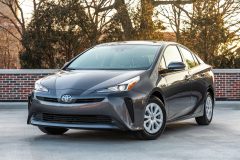
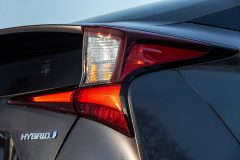
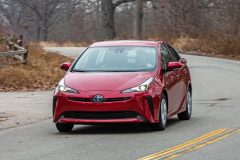
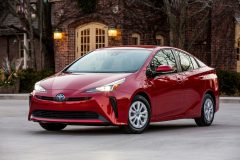
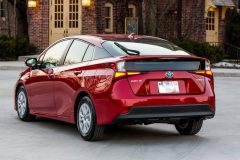

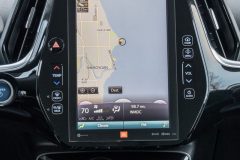
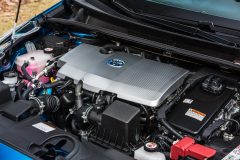
9 thoughts on “Road Test: 2020 Toyota Prius Hybrid”